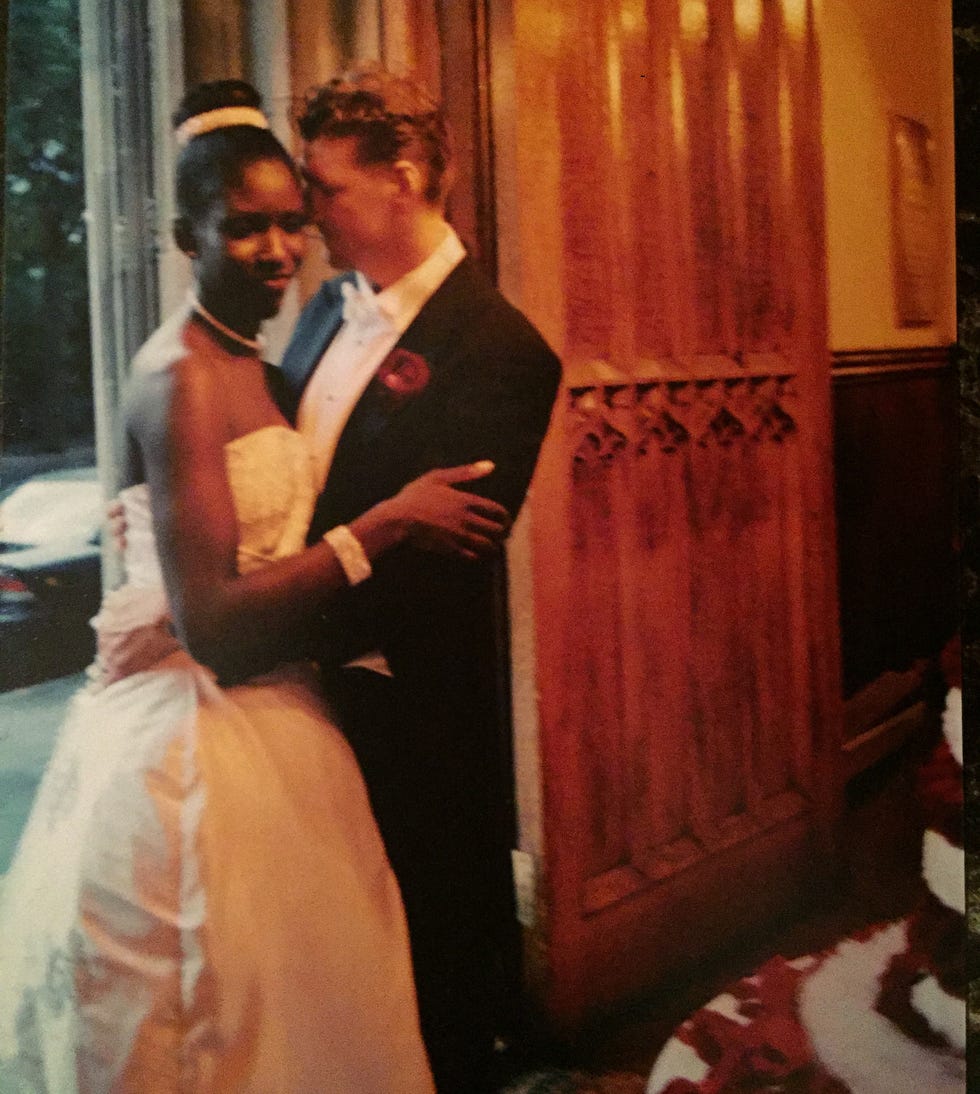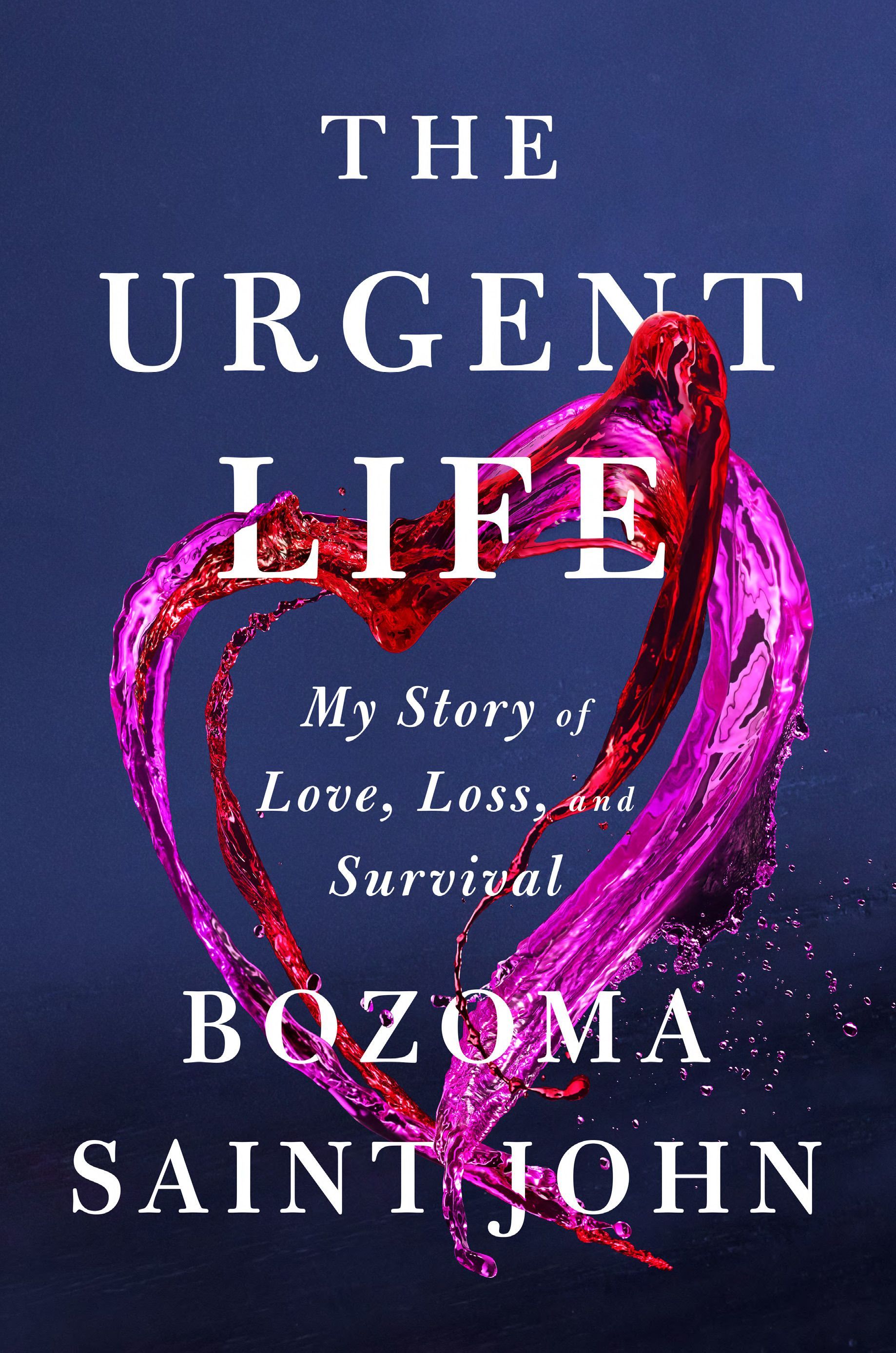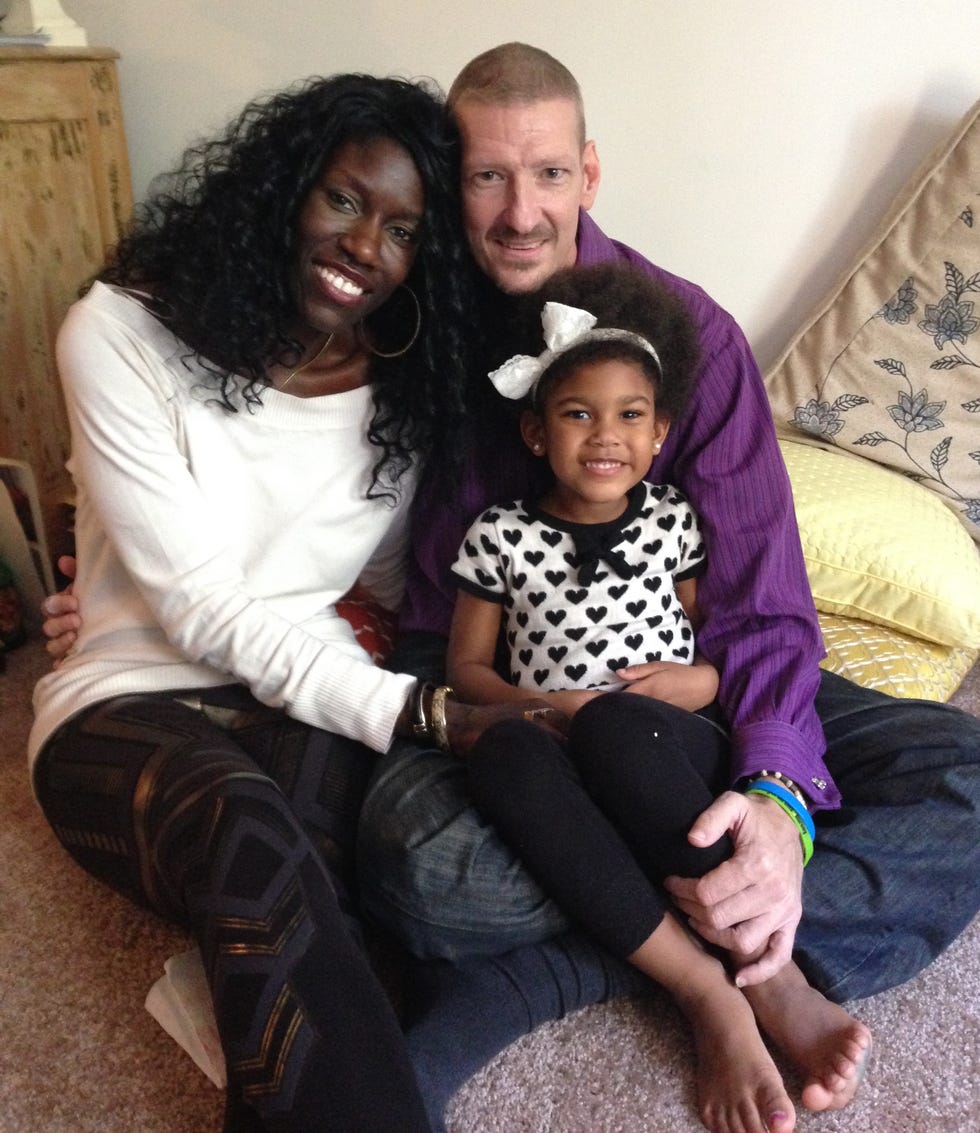In Bozoma Saint John’s upcoming memoir, The Urgent Life: My Story of Love, Loss, and Survival, the award-winning marketing executive—who’s held high-profile jobs at companies like Pepsi, Uber, and Netflix—gives a raw, unflinching account of what it means to grieve.
In December 2013, Saint John lost her husband, Peter, to cancer. By then, the couple had already navigated a complicated marriage; lost their child, Eve, after she was born prematurely; and co-parented their daughter, Lael, during the years when the two were separated. “Loss taught me to live with urgency,” Saint John writes. “Faith taught me that I could survive the unimaginable. And love gave me the endurance to overcome not only fear but overwhelming grief.” Below, in an abbreviated excerpt from The Urgent Life, she tells Eve’s story.
I cried for days after I found out I was pregnant. I cried when I was alone in the bathroom. When I was in the shower. While I was on my way to work. I’d known I was pregnant a week before I finally picked up the phone and told my mother.
I was starting to hit my stride professionally, filling in the boldest colors of my fabulous New York life. Having a child meant I’d have to stay in a marriage I was beginning to doubt and maybe jobs I’d begun to hate. I liked being able to go to a resort in the Caribbean or Mexico on a whim. Now, I would be fully responsible for another human being.
I’d read that women needed to get past the three-month mark to make sure their pregnancy was viable, so in those initial weeks, I only told my immediate family and closest friends that I was expecting. But when I crossed into my second trimester and my stomach began to push past my waistband, I began to tell my coworkers.
My colleagues were thrilled that I was pregnant, and slowly their giddiness began to make me more excited. Outside, on the street, I went from being just any random New Yorker to being an expectant mom. People treated me more delicately. At a restaurant, other patrons would let me cut the line. And when I rode the subway, commuters who might have bumped me without a second thought said excuse me and offered up their seats. The world tilted toward me seemingly overnight.
Still, my emotions remained complicated. I struggled to come to terms with the idea of being someone’s mother, and I continued to worry that Peter and I weren’t ready to build a family when our relationship wasn’t as perfect as I’d imagined.
Yet each time I went to the doctor, the seconds Peter and I waited to hear the baby’s heartbeat felt like hours. My need to know that life was pulsing inside me began to overwhelm my uncertainty, deepening my bond to my unborn baby.
My obstetrician was the opposite of the stereotypical stern clinician swathed in white. He cracked jokes as he checked my blood pressure or examined my sonogram. I, however, was never nonchalant when I went to the doctor. I peppered him with questions. Were there certain foods I should avoid eating? Was it normal for the baby’s heartbeat to be so rapid? If I felt a cramp, did that mean something was wrong?
“Don’t worry so much!” he told me, waving his hand. “Every woman has a different pregnancy. You’re young. You’re healthy. Everything will be fine.”
But I wasn’t so sure. I felt like something was off, like something was coming.
When I was about six months pregnant, the doctor decided to give me a relatively routine test to check the level of my amniotic fluid. The results, received a few days later, showed that my fluid was low. The nurse who phoned us said that wasn’t necessarily a bad sign. Still, they asked me to come back on Monday so they could check the fluid again.
Peter and I didn’t panic. The nurse said they were just being cautious since I was approaching my last trimester. We wanted to believe her.
I had the second amniotic test, and we found out that not only was my fluid low, the baby didn’t appear to be developing like it should. Our doctor continued to be nonchalant. Some people had low fluid, he said. And yes, the baby wasn’t quite the size that it should be at this point in the pregnancy, but the heartbeat was still strong, and everything else looked normal. Really, he said, I shouldn’t worry.
The morning of July 10, I walked by the desk of our vice president’s assistant, Melissa. “How are you feeling?” she asked me.
The truth was, I didn’t feel so well. “Umm, a little slow,” I said, offering her a wan smile. I made my way to my desk and sat down. A short time later, Melissa walked over.
“I know this isn’t something you want to hear when you’re pregnant—you really just don’t look good to me. I think you should go to the doctor.” I tried brushing her off. Yes, I was a little tired, but that was all. Besides, I had an appointment with my own OB-GYN in a couple of days.
“Humor me,” she said. “I’ll even go with you.” This is a pain in the ass, I thought as I grabbed my purse and waddled down to the clinic.
When we walked into the clinic, we were greeted by Jane, the type of sweet, old-school nurse who talked about her kids and would give you a lollipop even though you were a grown woman. Jane sat me down, then took my temperature. It was 98.6 on the nose, so no problem there. Then she took my blood pressure.
“Hmm,” she said, worry lines creasing her brow. “Here,” she said, walking over to the water cooler and bringing me back a cup. “Sip this.”
I asked her why, and she said my pressure was just a little high. But I noticed her whole demeanor had changed. She was serious, concerned. I drank the water, and we waited a few minutes before she took my pressure again. Then she asked me to lie down. She left the room, and when she came back, she was accompanied by the doctor. Jane told me to be calm. She just wanted the doctor to check me because she wasn’t sure she’d done the reading correctly.
Now, I really began to get anxious. “Can you just take my blood pressure?” I pleaded to the doctor.
He did. A few seconds later, he asked for the name of my obstetrician. He quickly left the room, and when he returned, he told me he’d called an ambulance.
The room started to spin. My blood pressure was way too high, he said. I needed to go to the hospital. I jumped up and reached for my cell phone to call Peter. He was as confused and scared as I was.
When I finally walked into the emergency room, there were doctors and nurses waiting with a wheelchair. “Are you Mrs. Saint John?”
“Yes,” I said, bewildered. What on earth was going on?
I was in a panic as the medical staff hooked me up to a monitor and took samples of my blood. I could hear people speaking in rushed whispers. I felt like everyone but me knew the truth of what was happening. Finally, I made a commotion, tossing something off a side table to get my doctor’s attention and force him to tell me what was going on.
For once he wasn’t cavalier. I had full-blown preeclampsia. My blood pressure was so high I was probably going to have a stroke. They had given me medication, but nothing was bringing my blood pressure down.
I unleashed my fury. “What are you talking about?” I yelled. “I’ve been asking you questions for months, and you told me everything was fine.”
My doctor literally began to back up, edging toward the door. “Well,” he said haltingly, “sometimes these cases, they just flare up. Anyway, I’m sorry, but we can’t wait another month for you to have this baby. You won’t survive.”
The words didn’t compute. I wasn’t thinking about dying. I was just thinking about how to make sure my baby lived.
Over the next few hours, I began to drift in and out, sleepy from the medicine they’d given me to try to reduce my blood pressure. Soon, another nurse entered my room. There was a new flurry of activity. Again, I asked, “What’s happening?” The nurse appeared surprised that I didn’t know. They were getting ready to induce me, she said.
Induce me? I hadn’t agreed to that. I was six and a half months pregnant. It was way too soon to have my baby. Then, Peter spoke up.
“Boz,” he said gently. “You have to have the baby today. There’s no choice.”
“There is a choice,” I said desperately. “There’s always a choice.”
“The choice is either we save you or we save the baby,” he said.
“Well,” I said, “then it’s the baby.” Peter just shook his head. I began to sob.
Was there anything else we could do? I asked him. His answer was chillingly to the point.
“No,” he said. “One of you will die. I had to make a decision.”
Suddenly, our roles had flipped. However indifferent I had been when I first got pregnant, now I would give my life for my baby to live. That was the right choice, I believed. But Peter, who’d been so elated, who’d literally counted the days until he could hold our child in his arms, had made a different decision. And I’d had no say.
Of course, I realize now that Peter had to do what he did. If I’d died, he would have lost us both. But I could not see that then. I wouldn’t be able to see it for a long time. There was no logic, just despair. And love.
The medical staff gave me Pitocin and I felt my abdomen tighten as my contractions began. The baby began to kick. Oh God, I thought. The baby knows it’s too soon and is fighting not to come out. Maybe I can hold off. Maybe I can control it.
But my body was moving without me. My stomach became taut as a drum as the baby kicked and kicked and kicked. It was torture, feeling how alive my baby was and knowing it was too soon for it to come into the world. Then, finally, I felt the need to push. I tried not to, even though it seemed every cell, every fiber in my body, was against me.
My obstetrician, who I would have punched in the face if I’d had the strength, loomed at the end of the bed. “Boz,” he said. “It’s time to push.”
I couldn’t fight anymore. Yielding to the pressure in my womb, I held tight, then released.
My daughter came out with one push. I felt relieved at first. She and I had given it all we could, and now the fight was over. I waited for her cries. But the only one I could hear crying was me.
A few minutes before, she’d been inside me, kicking furiously. How could so much life go away so quickly?
“I want to see her,” I said finally.
A nurse placed her in my arms. I thought about how much she looked like Peter, a scrim of golden hair framing her beautiful face. I counted her tiny fingers, her tiny toes. Everything about her was perfect.
Staring at my daughter, I decided to name her Eve, in honor of my mother, whose English name was Evelyn, and because she was my first girl.
I was still in the maternity ward, where I could hear the other newborn babies crying, so I asked if I could be moved to another floor. When it was finally time to hand Eve over to a nurse, I couldn’t do it. So, I handed her one last time to Peter. He carried her out of the room, and I never saw my daughter again.
Years later, Peter looked at me from his own hospital bed and told me not to worry. “I’ll go to heaven and take care of Eve, while you stay here and take care of Lael.”
He said it with a laugh. He was so thoughtful in that way, trying to reassure me when he was the one facing his own mortality. I managed a weak smile. “I guess that’s one way to look at it,” I said.
But a few days after he died, his brother Neil called me. Giavanna, his seven-year-old daughter, had had a dream and she needed to tell me about it. Gia, as we called her for short, had been especially close to Peter. When she came to the phone, she was crying.
The night before, Gia dreamed that she was at school, on the playground, and there was a giant tree. When she looked over, she saw Uncle Peter, peeking from behind it. Confused, she walked over. When she rounded the trunk, he was standing there holding a little girl. Gia wasn’t sure who the other child was, but she said Uncle Peter smiled and told her to tell me that everything is okay. Then she woke up.
Our families never talked about Eve. I don’t even think Gia knew that I’d lost a baby. And I’d never told anyone what Peter said to me in the hospital.
If one of Peter’s siblings or friends had called me and relayed that dream, I might have doubted it, wondering if they were just trying to make me feel better. I’m sure that’s why Peter picked Gia to come to. She was the perfect messenger.
My eyes welled with tears. And, for the first time in weeks, I smiled.
From THE URGENT LIFE by Bozoma Saint John, to be published on February 21, 2023 by Viking, an imprint of Penguin Publishing Group, a division of Penguin Random House, LLC. Copyright © 2023 by Bozoma Saint John.
Bozoma Saint John is an influencer and American businesswoman who has had a stellar career in marketing, most recently as the Global Chief Marketing Officer at Netflix. She began her career at Spike Lee’s advertising agency, then going on to become a senior marketing executive at Pepsi, Apple Music, Uber, and Endeavor. She has been featured on the cover of Adweek as “one of the most exciting personalities in advertising” and has been inducted into the American Advertising Federation Hall of Achievement, as well as the American Marketing Hall of Fame, among others. Bozoma was named the #1 most influential CMO by Forbes in 2021, and has created a successful online tutorial “The Badass Workshop” which teach others to be their greatest selves. Headshot taken by Amy Lombard.



